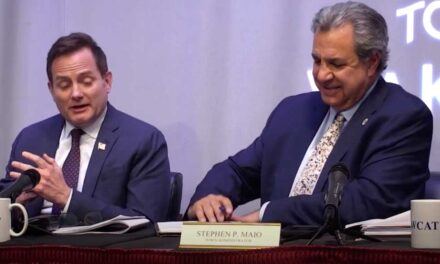Published in the October 6, 2016 edition.
By MARK SARDELLA
How things have changed.
Not so long ago, it was a given that drugs were bad, the police were good and American soldiers protected freedom and liberty at home and around the world.
These were universal values that served us well for generation after generation. Nowadays, expressing ideas that no one would have questioned a few years ago might land you before the Human Rights Commission.
The legalization of marijuana was nothing but a hippie pipe dream a few decades ago. Now we’re about to see pot shops in every town.
Next month, Massachusetts voters will be asked to legalize marijuana for recreational use and commercial sale. Some of the same people who want big money out of politics and think “profit” is a dirty word are happily looking the other way as out-of-state financiers funnel millions of dollars at Question 4 and stand to make a fortune if it passes.
Alcohol is legal, they say, so we should legalize another dangerous drug.
First, the pro-pot people softened us up by convincing a majority of the population that marijuana was “medicine.” And they swore up and down that it was only medical marijuana they were interested in legalizing, not recreational pot.
If you pointed out that medicinal marijuana was nothing but a foot in the door to get to full commercial legalization for recreational use, you were an inhumane ogre who wanted to deny the sick their treatment. Weed was the next penicillin, and if you didn’t agree, well you must work for pharmaceutical industry.
But just when the scammers had enough people fooled about medical marijuana to move to the next step, there was a problem. Along came the opioid crisis. People started seeing the devastation of drug use in the news every day. This would not bode well for the ultimate goal: full recreational and commercial legalization of another drug.
Then someone had a genius idea (probably while stoned). Let’s push pot as the solution to the opioid crisis! So they started telling us that marijuana would “reduce the use of opioids by 25 percent.”
They have been screaming for years that pot was a totally different kind of drug from opiates and should not be lumped together with such heavy drugs. But now, pot is going to replace opiates for the treatment of chronic pain.
Oddly, millions of hippies since the 1960s never noticed this pain-relieving property of marijuana. If anything, they knew marijuana was a drug that intensified what you were feeling, good or bad.
Music sounded better when you were stoned. You heard notes and beats in your favorite songs that you had never noticed before. Far out, man!
But it could work the other was just as easily. It could make your brain latch onto a negative thought and not let it go. Potheads called this phenomenon “paranoia,” and it was a real bummer, dude.
Now, all of a sudden pot is a powerful painkiller!
Such is the nature of being a pot advocate. Totally opposite arguments can be simultaneously advanced with a straight face while inconvenient data is ignored.
Like the news from Colorado that the use of opioids has actually increased, not decreased, since the state legalized marijuana.
And contrary to claims by the marijuana lobby, use of marijuana has risen among 12- to 17-year-olds since the drug was legalized, according to the state-funded Healthy Kids Colorado Survey published last summer. And Colorado already had the highest rate of youth marijuana use in the country. Gee, I wonder why.
Wakefield Police Chief Rick Smith recently said that drugs are driving an increase in crime Wakefield and the surrounding region, and it’s not just opiates.
“Another issue is the public acceptance of marijuana,” Chief Smith said. “More and more people are leaning toward the commercialization of marijuana. The facts show that our youth exhibit more bad behavior since the social acceptance of marijuana.”
Is there any greater signal of the social acceptance of marijuana than legally sanctioning its use?
That’s where we’re headed if Question 4 passes. More drug use, not less. More crime, not less.
If that’s the kind of state you want to live in, vote ‘Yes’ on Question 4.




